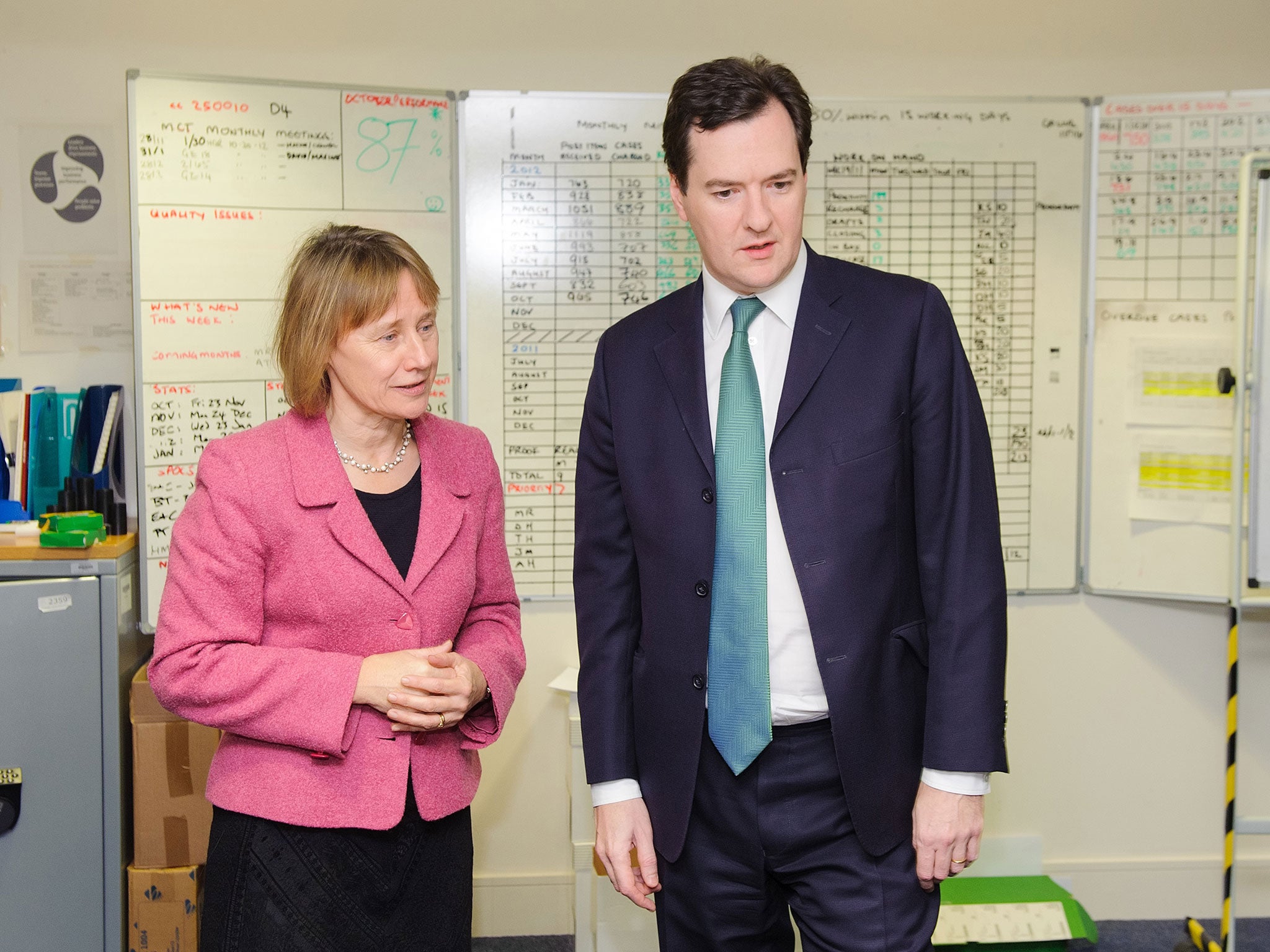No wonder Lin Homer's a dame: she knows where the bodies are buried
Outlook: The House of Commons Public Accounts Committee described Dame Lin’s HMRC as “staggeringly bad” on the issue of responding to queries

To listen to George Osborne, we should be mourning the departure of a superstar, perhaps even a secular saint. He hailed the outgoing boss of HM Revenue & Customs, Dame Lin Homer, for having made a “real contribution” to “public sector modernisation and transformation” of which she could “be proud”.
The head of the Civil Service, Sir Jeremy Heywood, also chimed in, gushing about how she served “with great distinction”.
Those trying to get answers from HMRC about their tax returns may well be gagging at this point. Their views are probably more in tune with those of the House of Commons Public Accounts Committee, which described Dame Lin’s HMRC as “staggeringly bad” on the issue of responding to queries. It also castigated the organisation for poor performance and a lack of ambition and criticised it as “unacceptably slow” to take action against tax avoiders.
That other Dame, Margaret Hodge, the former PAC chairwoman described Dame Lin as “always polite and a solid performer at PAC but presided over awful service”.
The reality, when it comes to Dame Lin, may lie somewhere between those two extremes. Andrew Tyrie, the chairman of the Treasury Select Committee, noted that she had done “a tough job in difficult circumstances”. These circumstances saw her trapped between two conflicting government imperatives. HMRC was told to do more and to stand in the vanguard of attempts to squeeze more revenue from wealthy tax cheats while pushing through a modernisation programme to facilitate it getting by with far less.
Caught in the middle was Joe Public, forced every year to fill in long and intimidating forms, with the threat of penalties for making honest mistakes – a Joe Public unable to get the phone answered.
Against this, the motivation for allowing Dame Lin to leave garlanded with praise, not to mention that damehood, becomes obvious: she knows where the bodies are buried. She may not have been a first rate chief executive, but she could, if she were so minded, make a “real contribution” to “public sector modernisation and transformation” by helping a future PAC to open up some graves. And to conduct some post-mortem work on the inner workings of her former employer at a time when the pressure from its masters was intense and, arguably, unrealistic. Mr Osborne and Sir Jeremy couldn’t let that happen. They’ve probably ensured that it won’t.
The Bowie bond and the bankers’ back catalogues
If James Brown was the godfather of soul, was David Bowie the godfather of securitisation? The musician, who has died aged 69, became an innovator in business when he sold the rights to royalties from his substantial back catalogue for an upfront payment of £35m in the 1990s. A bevy of artists followed suit by producing cover versions of the “Bowie bond”.
So did a bevy of bankers, who’d started to do the same sort of thing with sub-prime mortgages which, like back catalogues, are supposed to offer stable and relatively predictable earnings streams.
The performance of the Bowie bond ran into trouble thanks to an unexpected fall in sales of recorded music fuelled by illegal downloading. Bankers like to point out that they couldn’t have predicted the economic shocks that wrecked what they’d been securitising. But in contrast to Mr Bowie, who sold classics, they’d been punting junk that spread a disease throughout the financial system.
With sales of Bowie’s work set to take off, it’s not inconceivable that his heirs could repeat his trick. There have been signs that the music industry more generally has started to adapt to the impact of the internet that caused problems for his first bond. The bankers? You’d hope people would have learned not to trust them a second time around. You’d hope, because scientists will have discovered Life on Mars before that industry ch-ch-changes.
Place your bets now on the Sportech sale
What’s the dividend forecast for Sportech now that NetPlay TV has pulled out of the auction it is currently conducting for its football pools business?
You could say that its shareholders are already winners. People have long predicted the demise of the game that asks punters to pick eight score draws from the fixture list and was once the weekly folly of a third of this country’s adult population.
And yet it is still here, even if it is but a shadow of what it was before the launch of the National Lottery.
Sportech says it has stemmed the decline. There’s still some attrition from the old-school part of this old-school business, the one that relies on weekly collections of coupons and stake money, but given that it’s only marginally profitable, the company isn’t too worried about that.
Customers who have migrated online, and on to direct debits, make Sportech around £15m before deductions, a sum which sparked NetPlay’s initial interest. Sportech says it has other interested parties, and the sale process will continue. The business still faces a number of challenges – most players are now over 60 and younger football fans seem to prefer accumulators offered by bookmakers which can also serve as low-stakes, high-return bets. Sportech will be hailed as a jackpot winner if it can pull this one off.
Join our commenting forum
Join thought-provoking conversations, follow other Independent readers and see their replies
Comments
Bookmark popover
Removed from bookmarks